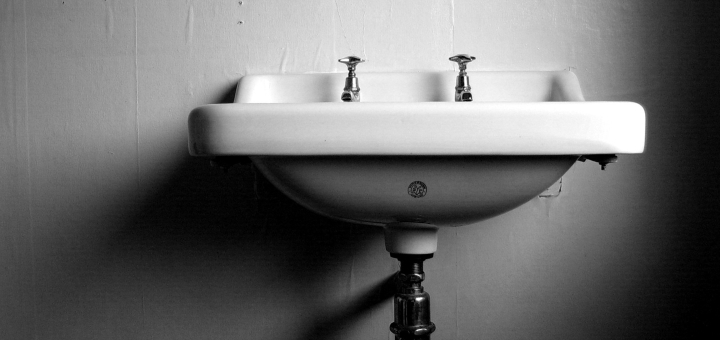
 Image credit: FreeImages.com, CC0/PD[/caption]
I admit it -- I wash my hands more than the average person. Whether it comes from all those microbiology and food service management classes I took in college, 15 years working in healthcare, or the CDC’s claim that hand-washing is the best way to prevent cold and flu, I wash my hands at least 15 times a day. So over my lifetime, I’ve washed my hands maybe 200,000 times. Naturally, I have passed on to my 5-year-old son the importance of hand-washing, especially before eating.
One day, when I put a snack out for him while he was in the bathroom, he said, “Oh, I can’t eat that; my hands are not clean!” Knowing I taught him about hand-washing after using the restroom, I said, “Didn’t you wash your hands after you went to the potty?” He responded, “Yes.”
“With soap?”
“Yes.”
So I told him, “Well, if you washed your hands, then they’re clean. You can go ahead and eat your snack.” Then he happily picked up an apple slice.
Right after those words to my son came out of my mouth, the spiritual metaphor I had missed during those 200,000 hand-washings suddenly dawned on me.
Image credit: FreeImages.com, CC0/PD[/caption]
I admit it -- I wash my hands more than the average person. Whether it comes from all those microbiology and food service management classes I took in college, 15 years working in healthcare, or the CDC’s claim that hand-washing is the best way to prevent cold and flu, I wash my hands at least 15 times a day. So over my lifetime, I’ve washed my hands maybe 200,000 times. Naturally, I have passed on to my 5-year-old son the importance of hand-washing, especially before eating.
One day, when I put a snack out for him while he was in the bathroom, he said, “Oh, I can’t eat that; my hands are not clean!” Knowing I taught him about hand-washing after using the restroom, I said, “Didn’t you wash your hands after you went to the potty?” He responded, “Yes.”
“With soap?”
“Yes.”
So I told him, “Well, if you washed your hands, then they’re clean. You can go ahead and eat your snack.” Then he happily picked up an apple slice.
Right after those words to my son came out of my mouth, the spiritual metaphor I had missed during those 200,000 hand-washings suddenly dawned on me.
Wash me, and I shall be whiter than snow
When we sin, we “get our hands dirty,” as the expression goes. Our souls become dirty from our wrongdoings. If we fail to address our sins, the spiritual dirt and germ of our sins can spread within ourselves and even to others. When we repent, though, we ask God to wash our souls and make them clean again, and he does! We are once again clean, and our sin is gone in God’s eyes. As David says in Psalm 51Wash me, and I will be whiter than snow. You will let me hear gladness and joy.Yet so often, even after we have repented, even after we have received absolution through the sacrament of Reconciliation, we still think we are dirty. Like my son hesitated to eat his snack, we hesitate to approach God because we still think we are not clean enough yet. Guess who loves it when we believe the lie that God has not made us clean? The Father of Lies. Who relishes every moment we hide from the Light and wallow in guilt and self-pity? The Prince of Darkness. After all, despairing of God’s mercy is a great way to keep us from seeking it.
Do it God’s way
I once heard this story about St. Faustina: A priest asked St. Faustina to prove it was actually Jesus appearing to her by asking her to ask Jesus what that priest’s worst sin had been. St. Faustina returned to the priest the next day and said, “He told me you have been to confession, so He does not remember your sins.” When I first heard that story, I found it hard to believe. I mean, I certainly remember bad things people have done to me after I have forgiven them. How could our All-Knowing God not remember someone’s sins? In light of this idea of God washing us with His mercy the way I wash my hands, this makes much more sense. Even if my hands were covered in all kinds of filth and germs, once I have thoroughly washed my hands, I forget about whatever was dirtying my hands and go on with my day. Though my hand were once quite dirty, it is no longer relevant after I have made them clean again. So, too, with our souls! Once we have turned away from our sins and thoroughly repented, we must trust that God has, in fact, made us clean. Our guilt, in God’s eyes, is washed away. It served its purpose, urging us to turn back to God. Now we no longer need it, except perhaps as a reminder to avoid getting dirty in that way again. During this Lenten season, let us turn to God in the Sacrament of Reconciliation. Let us allow Him to wash away our sins. Then, let us bask in the cleanness of our souls and let go of the guilt that, to God, is gone.Copyright 2019 Monica Portogallo
About the Author

Monica Portogallo
Monica Portogallo is a mother and registered dietitian nutritionist who does her best not to miss the lessons God sends to her through the joys and struggles of daily life. She lives in California.


.png?width=1806&height=731&name=CatholicMom_hcfm_logo1_pos_871c_2728c%20(002).png)
Comments